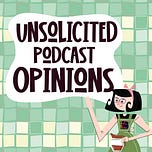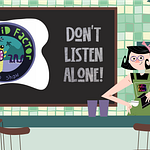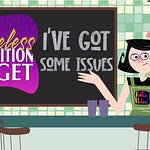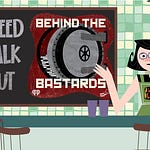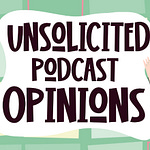I tried not to drown this episode in TTRPG babble, but GOD I miss playing tabletop games. Every time I listen to this podcast, I go “I WANNA PLAAAAAAAAY!”
Anyway. Let’s mosey!1
Annotated Transcription
Ẹ Ǹlẹ́ o, friends! I’m Katie Nolan, and this is Unsolicited Podcast Opinions, the show where you get more than my two cents: you get the whole damn dollar.
Episodes like today’s are why I created the show in the first place. Today, I’m talking about Three Black Halflings.
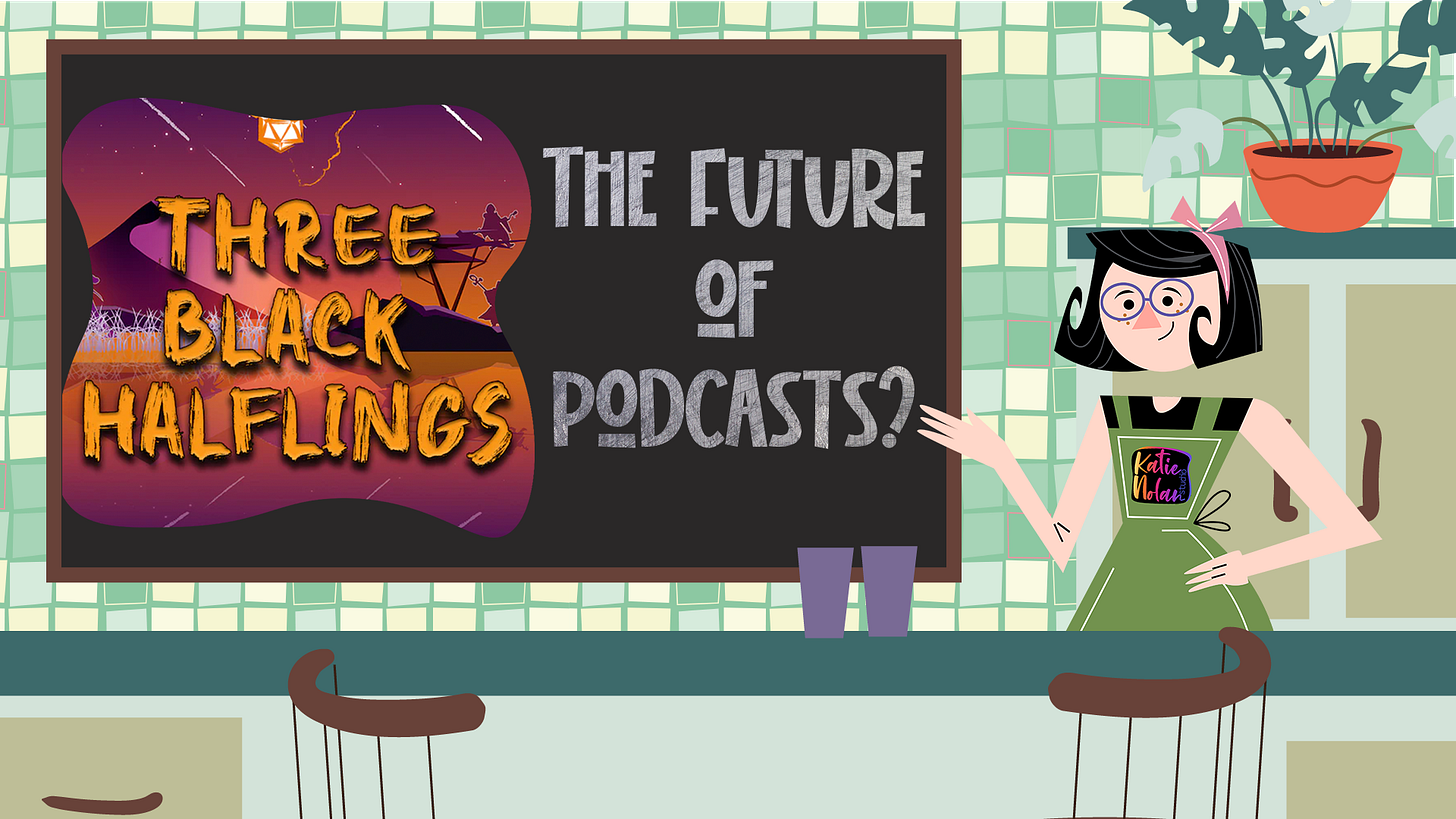
Three Black Halflings is a TTRPG, or “tabletop roleplaying game,” podcast. But it’s unlike any other TTRPG podcast I’ve ever heard.
There are a lot of podcasts where you can listen to people play a game. There are podcasts where people talk about games, their mechanics, their lore, their opinions on updates. And of course, there are interview podcasts.
Three Black Halflings doesn’t do any of those things; it does ALL of those things. It’s a joyful, creative, and chaotic celebration of gamer culture that puts the Black and BIPOC experience front and center.
I’ll say up front that if you aren’t interested in roleplaying games or nerd culture, Three Black Halflings is not for you. But if you’re interested in podcasting as an industry/art form, there’s a lot you can learn from this series, regardless of your interest in roleplaying games themselves.
But first, let me lay a little groundwork for those of you who don’t play TTRPGs.
(Hi Alicia!)
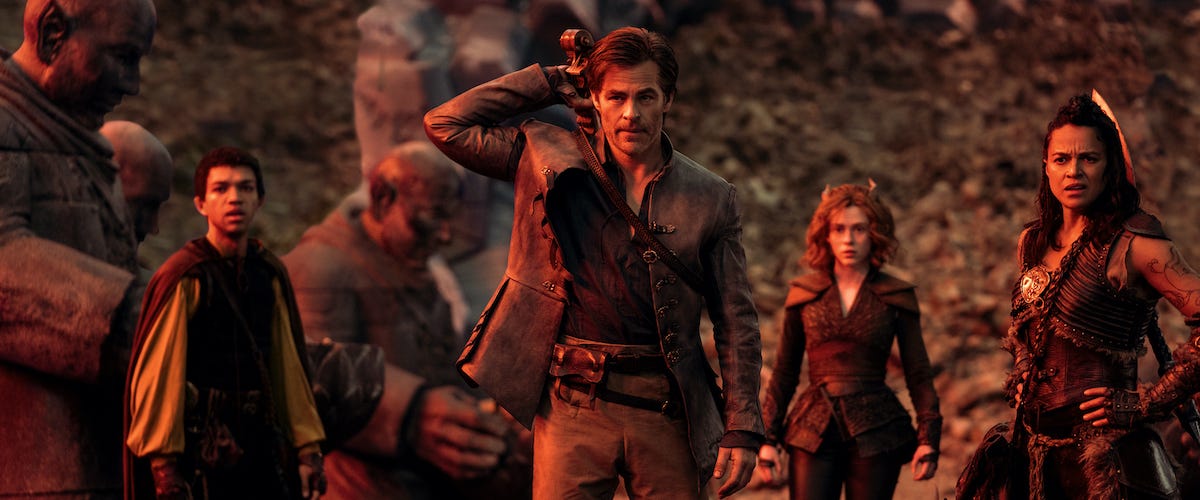
If you’ve been in a game store or even watched Stranger Things, you’ve very likely seen people playing a tabletop roleplaying game. At its most basic, it’s a small group of people sitting around a table with pieces of paper, pencils, and dice, playing characters who go on an adventure.
Dungeons & Dragons2 came out in 1974 and is widely considered to be the first commercially available tabletop roleplaying game. It essentially took miniature wargames3 (think Battleship, but infinitely more complicated) and said: “But what if we added some improv and a whole lot of world-building?”
So instead of orchestrating the movement of troops and military resources, like in war miniature games, players take on the roles of individual characters. They’re also in an explicitly fantasy world, heavily inspired by the work of J.R.R. Tolkien, who’d risen to enormous popularity in the US during the 1960s.4
To this day, Dungeons and Dragons (or D&D) is one of, if not the, most popular tabletop roleplaying games in the world, and there are more than a hundred podcasts about it.5
Which brings us to Three Black Halflings.
Three Black Halflings launched in June 2020 and was originally hosted by three friends: Jasper William Cartwright, Jeremy Cobb, and Luyanda Unati Lewis-Nyawo, who goes by Unati. They’re all actors from across the African diaspora who met in London’s theater scene, which I think is really cool. Here’s how Jasper describes the series in the first episode:
Jasper: Now, if you didn’t guess it from the title, we are indeed three people of color from around the world who have come together to chat and laugh about this amazing game. We’re all DMs and have various levels of experience, so whether you are a seasoned sorcerer looking for new ideas or a fumbling fighter looking to learn the ropes, we have got you. We hope to cover a range of topics in this show from DM tips and tricks to player advice and, hopefully, some fun and silly stories along the way.
But first, they have to address the elephant in the room: the racism built into Dungeons and Dragons.
Because it’s so heavily inspired by J.R.R. Tolkien, D&D inherits a certain amount of racism from his work. The game adopted many of the “races” that exist in Tolkien’s world, such as elves, humans, and orcs. Elves and humans are almost universally light-skinned and come from “the West,” while orcs come from “the East” and are an amalgamation of every negative stereotype about Black and Asian peoples.6
As Jeremy goes to explain in the episode “It’s Okay Frodo, I Don’t Actually See Height” –
Jeremy: And in D&D, I mean – it’s, they’re not always pale, there are some subraces that are more bronze-skinned, but the only subrace in D&D that is explicitly stated to have dark skin is evil.
There are a number of excuses people try to make for this kind of racism: everything from in-world justifications for why that’s the case and so no, it has nothing to do with real-life racism, to “it’s just fantasy” or “it’s just a game.”
But the truth is, it’s not just fantasy, and it’s not just a game. In that same episode, Jasper shares the personal impact the lore in D&D has had on him.
Jaspar: That quote you just said there about not belonging to either of the parents’ lineage? That is exactly how I have felt as someone of mixed heritage throughout my entire life. It’s something that I’ve always felt really – have struggled with, being told that I wasn’t white nor Black enough. I think that this is a really unhelpful thing that is contained in these books, is the idea that you are neither one thing nor another, you are not enough of one thing, or that you’re somehow held back by another thing.
I think within the book it says – let me see if I can find it – basically, there is an example where it says that the half-orcs and half-humans are – the half-orcs have an advantage over orcs because of their human side. So basically it’s saying that one half of you is good and one half of you is bad, and the dichotomy within yourself and how that makes you feel as a person of mixed heritage is incredibly difficult to deal with.
At the same time, they keep everything affectionate and light-hearted. Like, there is so much laughter in this very deep conversation about systemic racism in D&D. Like Unati says in that episode:
Unati: I think what just happened is really indicative of, like, the fact that you can have these conversations and have it not turn into a bloody culture war. Like, you can ask – we just want to talk, we're not blaming you! No one is!
Jaspar: We want to have fun!
Unati: Fun! Yeah, we just want to talk, have fun.
Three Black Halflings seems to be deliberately designed as a BIPOC space where white people are welcomed. They aren’t reaching out to white people who need to be taught why “reverse racism” isn’t real, but they are gentle and generous in a way that invites my white self to stay and have fun with them.
And of course it’s not all racism all the time. Like they said, they want to have fun! They very quickly incorporate actual-play campaigns into the podcast, where you can listen to them play a campaign – and given that they’re all very talented actors, it is a lot of fun to listen to their different character voices.
Jeremy: Tololee7 stands next to you, Ongenagama, and just looks down at Mooti like, "Is he okay?"
Unati: Um, he’s prone to such oddities. You see, he was – he spent some time with Moongohige, and I think he’s –
Jeremy: You know what, you don’t need to say anything else. You don’t need to say anything. Else.
They also incorporate guest interviews into the podcast and, over the years, expand the scope of conversation to include more general fantasy and nerd culture topics. At some point, Unati steps back and Olivia Kennedy joins as the new co-host.
I don’t know at what point this happens because I haven’t listened to the entire podcast. And I haven’t listened to the entire podcast because it’s not designed for binge listening.
The Three Black Halflings podcast feed is a chaotic mess.
They don’t organize their content into seasons, or set aside a few weeks in a row where they only release the actual-plays for a single campaign. There are four unrelated episodes between the first episode of The Cub & The Caterpillar campaign and the second, and there are two episodes of an entirely different game between The Cub & The Caterpillar episode two and episode three.
I can’t just push play and let one episode after another play. If I want to listen to one of their campaigns, I have to scroll through their whole feed and pick out the next episode in their campaign.
Yes, they could get around this issue by having them be separate podcasts on separate feeds, but that diminishes the value of each individual feed. Or they could more carefully plan what episodes come out when. But honestly? I don’t think they should have to.
Because you know where I don’t run into this problem?
Their YOUTUBE channel.
Now Three Black Halflings only has a tiny fraction of their episodes available on YouTube, which is part of the reason I’m still subscribed to their RSS feed, but what they do have on YouTube is beautifully organized into playlists. They have a playlist specifically for interviews and a playlist specifically for their campaign Tales of Wagadu: The Curse of the Spider Queen.
I can push play on a playlist and get frictionless access to the content I want.
AND I can be subscribed to their channel so I can easily see when they’ve uploaded a new video, because it will appear on my subscription feed. They’re also able to promote other Headgum podcasts by featuring those channels on their YouTube front page.
Finally, YouTube helps solve a discoverability problem for listeners. Yes, its recommendation engine has radicalized a whole bunch of white supremacists and I’m not ready to forgive it for that, but it also would have gone “Oh, you enjoy the Rusty Quill Gaming podcast? You should check out Three Black Halflings!” and I wouldn’t’ve had to discover Three Black Halflings through Jasper giving a presentation at a podcasting industry conference.
I’ve seen a lot of professional podcasters talk about whether podcasts will “pivot to video” and a lot of conversations about video versus audio, but I think the REAL question is:
RSS feed versus YouTube.
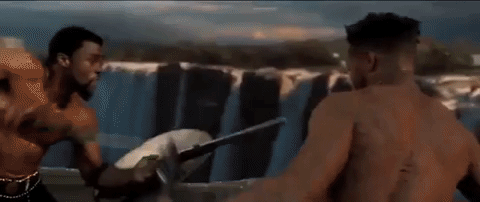
RSS stands for “Really Simple Syndication,” and it is the backbone of podcast distribution.8
Podcast distribution basically works like this: You upload your podcast to a host like Libsyn or, in my case, Substack. Your podcast host then creates an RSS feed that automatically updates every time you post a new episode. You then tell Apple and Spotify “Hey, here’s the RSS feed for my podcast!” and they add it to their database. You only have to do that once. After that, every time you upload a new episode, podcast players automatically update from your RSS feed.
RSS feeds have enormous benefits. They’ve been around since 1999, so they’re extremely stable and very well understood by programmers. More importantly, they don’t care whether you use Apple or Microsoft, whether you listen using Apple Podcasts, Spotify, Overcast, or your web browser.
And you own them. Even if you switch from one podcast host to another, you’re able to export your RSS feed and then upload it to your new provider.
But, as we can see from Three Black Halflings, RSS has some limitations.
…Or does it?
Because I kind of lied a little earlier. The question isn’t really YouTube versus RSS because technically RSS could use tags to perform the function of YouTube’s playlists. Think about it: you can filter blog posts, and those are also released via RSS.
So the problem isn’t really RSS. The problem is that podcast players aren’t ready to compete with YouTube. And they need to get ready.
I think Three Black Halflings represents the future of podcasting
or at least a very part of the future. One where listeners are more attached to the hosts rather than the topic, and will follow those hosts from project to project as long as it’s easy.
We already see this happening with YouTube creators like The Try Guys and Watcher Entertainment, both of whom have multiple wildly different projects all on the same channel, but organized into playlists. (Watcher has also taken advantage of YouTube’s new podcast feature to turn some of their existing shows into podcasts.)
And I mean, think about it:
You have a true crime podcast where each season covers a different crime. You can have a playlist for each season.
You’re a travel podcast. You can have a playlist for “Traveling on a Dime” and a separate playlist for “Traveling in Luxury,” and expand your potential audience while still producing niche content.
Or you’re an investigative journalist who prefers to create limited-run series. Each series can be a different playlist instead of separate RSS feeds, making it easier for fans of your work to follow your new projects.
Of course, I could be wrong. Predicting the future is a dangerous business, and I’m not an app builder, so I don’t actually know how difficult it would be to create a podcast app that uses RSS but implements the tags and has similar features to YouTube.
But if anyone out there IS an app builder and thinks this idea is interesting, I’d love to know. Because we need to keep developing alternatives to YouTube. We can’t keep centralizing if we’re going to keep the benefits of RSS.
So anyway, back to Three Black Halflings.
If you like listening to actual-play podcasts, I recommend going onto their YouTube channel and listening to Tales of Wagadu: The Curse of the Spider Queen. It’s a lot of fun, and if you like that, it’ll be well-worth going through their RSS feed and trying to pick out their other actual-plays.
If you don’t want to listen to an actual play but you love hearing ridiculous stories from gaming tables, “Bat Encounters Will Go Wrong” has some hilarious ones about things that have gone wrong while running a D&D game.
And if you’re interested in a heartfelt and thoughtful reflection on the Black Lives Matter movement, their episode “American Flag Through the Heart of Racism” is an oldie but still really relevant.
Finally, a question for you:
Are you subscribed to Unsolicited Podcast Opinions? If the answer’s yes, huzzah! Let’s have a dance party! Pew pew pew!!! If not, come join the fun! I release a new episode every other Friday.
And if you opt for a paid subscription, you’ll also get exclusive behind-the-scenes content and even more opinions. C’mon, who doesn’t want even more opinions? Go to unsolicitedpod.com or search for “Unsolicited Podcast Opinions” on your podcast player of choice.
Unsolicited Podcast Opinions is a production of Katie Nolan Studio.
It’s executive produced by the wonderful Alicia Green.
Odabo, friends!
Not actually a TTRPG reference, but it felt appropriate regardless.
Seriously. Here’s a list of just 100.
This analysis comes from James Mendez Hodes’ incredible two articles on racism in Tolkien’s work: Orcs, Britons, and The Martial Race Myth
I couldn’t find a transcription of this episode, so I apologize for spelling errors in the names.


